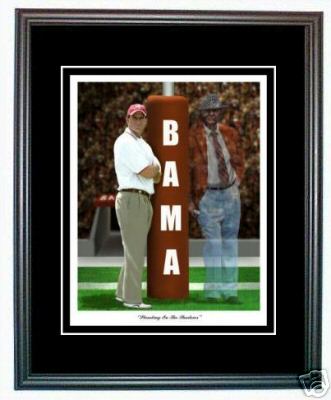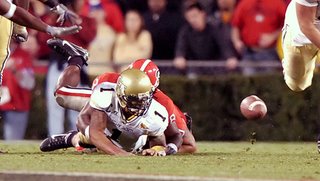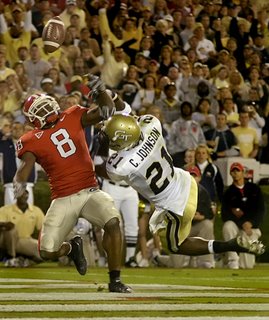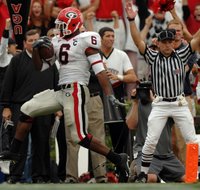End of Season News and Notes
Alas, the 12 Saturdays of Christmas are behind us, leaving only a few dozen meaningless bowl games, including one that likely will prove what we already know:
The Coaching Guillotine:
I agree with Paul Westerdawg that, generally speaking, what’s good for Bama football is good for Georgia as well. Like
But hubris and an itchy trigger finger have been crippling to the Capstone since Bear Bryant’s retirement in 1982. A program that’s gone through six head coaches in 24 years hardly screams “job security,” so firing a coach in what is already a seller’s market for top-tier coaches was an ill-timed maneuver. And for all its tradition, support and resources, pitching
Bryant’s retirement in 1982. A program that’s gone through six head coaches in 24 years hardly screams “job security,” so firing a coach in what is already a seller’s market for top-tier coaches was an ill-timed maneuver. And for all its tradition, support and resources, pitching
Now with that said, there’s plenty to recommend the
Last words on this: Shula was clearly a desperation hire. The only thing that made him a better hire than Ray Goff is the fact that Georgia had pretty much the entire 1988 season to find Dooley’s replacement and Goff, sadly, was still the best we could come up with. The Bama gig fell into Shula’s lap in the shadow of two-a-days after … (must … resist … lame quip about laps, Mike Price and strippers) … anyway, you get the point. Having posted the opening right after Thanksgiving,
On to
As Stafford & Co. lined up in the victory formation to salt away the final 60 seconds, CBS’ camera panned over to the Georgia Tech bench, where Ball was patting the shoulders and helmets of his team mates. There could not have been a lonelier image. Not a single player so much as glanced in his direction. In the waning seconds of his final regular season game, Reggie’s teammates accorded him less attention they would have to a fart in the breeze.
 Ball is one of the more curious characters in the history of Clean Old-Fashioned Hate. I really can’t think of another rival player for whom I’ve felt so much distaste that it’s caused me to feel outright compassion for everyone else associated with his program. By being such a honking embarrassment for four years, he managed to humanize a program Dan Magill termed "the eternal enemy." If you’re a Tech fan or player, what do you make of a guy who picks fights with an opposing team’s trainers, loses track of downs and single-handedly squanders the greatest receiving talent in your program’s history – all against your hands-down biggest rival? And how does one muster optimism for a program that, in four years, failed to put anyone more consistent under center than a guy whose football IQ is the same as his jersey number?
Ball is one of the more curious characters in the history of Clean Old-Fashioned Hate. I really can’t think of another rival player for whom I’ve felt so much distaste that it’s caused me to feel outright compassion for everyone else associated with his program. By being such a honking embarrassment for four years, he managed to humanize a program Dan Magill termed "the eternal enemy." If you’re a Tech fan or player, what do you make of a guy who picks fights with an opposing team’s trainers, loses track of downs and single-handedly squanders the greatest receiving talent in your program’s history – all against your hands-down biggest rival? And how does one muster optimism for a program that, in four years, failed to put anyone more consistent under center than a guy whose football IQ is the same as his jersey number?
The last shot I saw of Reggie (and it may well be one of the last times any of us ever see him on camera, unless he shows up on “COPS”), he was separate from his teammates, surrounded only by two state troopers, as “Reg-gie, Reg-gie!” chants rained down on him from the
I know the stats say otherwise, but you could almost argue that Tech was one player away from a win Saturday. And that player would be the hothead with the ridiculously overcompensating sleeves of tattoos on his arms. Note that I said almost, because if you’ve got Paul Oliver’s back, I’ve got yours. In the admittedly rare instances when Ball was on target to Calvin Johnson, Oliver intervened to heroic effect. When a 6’5”, 235-pound All-American receiver who runs a 4.3 40 leaves the field with two catches for 13 yards and no touchdowns (in spite of a first-and-goal), you have to awe the guy who was covering him.
almost argue that Tech was one player away from a win Saturday. And that player would be the hothead with the ridiculously overcompensating sleeves of tattoos on his arms. Note that I said almost, because if you’ve got Paul Oliver’s back, I’ve got yours. In the admittedly rare instances when Ball was on target to Calvin Johnson, Oliver intervened to heroic effect. When a 6’5”, 235-pound All-American receiver who runs a 4.3 40 leaves the field with two catches for 13 yards and no touchdowns (in spite of a first-and-goal), you have to awe the guy who was covering him.
I was pleased to read that Mike Bobo was calling the plays Saturday and that play-calling will be a new part of his job description. As Paul notes, the view from the booth is superior to the view from the field, and it is high time Richt gravitated away from the minutiae of toss sweeps and out routes and developed the holistic perspective of a head coach. And while Bobo’s playcalling only netted 8 points, it also produced
So, with an 8-4 regular season in the can and a presumptive trip to the Peach Bowl ahead, where does that leave us? In pretty good shape, I think; a helluva lot better than where things were headed in October. Matthew Stafford has figured out how to drive Richt’s and Bobo’s offense someplace other than into a telephone pole, his receivers have learned what to do when he points his Howitzer their way and Richt’s evolution as a head coach has progressed with some much-needed delegation of playcalling duties. As might be expected of a defense coordinated by a former DB coach, our rushing defense remains suspect, but we closed the season by bowing up in a pair of rivalry games, allowing less than 200 yards and 20 points in each. Our OL will lose depth, some of which will be missed, some of which … eh, not so much. Regardless, help is on the way. Really. EDIT: Cavalry's still comin'.
In the meantime, here some final thoughts on the season that was. As is probably the case for most

















